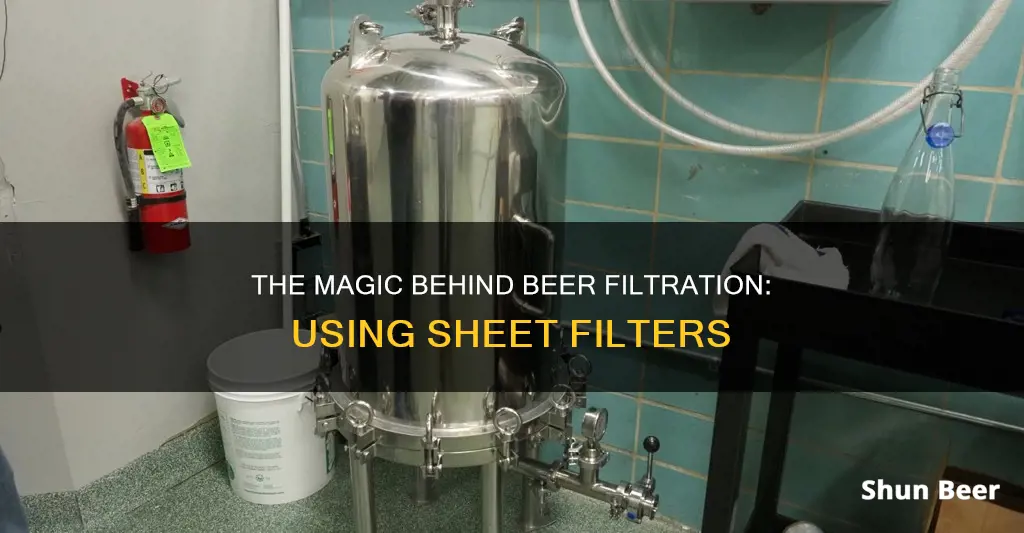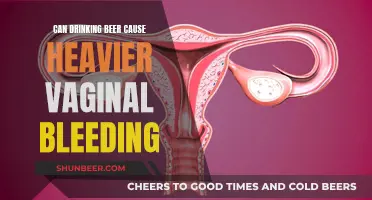
Beer filtration is the process of removing suspended particles and haze from beer to achieve a clear, stable product. While ancient techniques used straw mats, cloth, or straws, modern filtration methods employ mechanical processes, such as sheet filters, to remove sediment, yeast, and other solids. Sheet filters, consisting of sheets pressed between plates with inlet and outlet channels, are popular among small-batch breweries due to their ease of use and ability to customise the filtration level. The sheets come in various porosities, ranging from coarse to fine to sterile, and are typically made from cellulose impregnated with diatomaceous earth. During filtration, beer is forced through the sheets, which only allow particles smaller than a specified size to pass through, trapping suspended particles and creating a clear beverage.
What You'll Learn
- Sheet filters remove suspended particles from beer
- They are made of sheets pressed between plates with inlet and outlet channels
- Sheets are made from materials like cellulose and diatomaceous earth
- Sheet filters are more popular with small-batch breweries
- They are straightforward to use and relatively inexpensive

Sheet filters remove suspended particles from beer
Sheet filters are an effective way to remove suspended particles from beer. The filtration process involves passing beer through sheets of filter material, trapping particles and allowing only liquid to pass through. The sheets are placed in a filtering frame and can be made from a variety of materials, traditionally cellulose impregnated with diatomaceous earth.
The sheets are designed with a specific pore size, ranging from coarse to fine, to capture particles larger than a certain size. This pore size is crucial in determining the filtration rating of the sheet, which can be "rough", "fine", or "sterile". Rough filtration removes much of the yeast and solids, fine filtration yields a nearly transparent beer, and sterile filtration removes almost all microorganisms. The brewer can choose the desired level of filtration based on their specific requirements.
Sheet filters are relatively straightforward to use and provide flexibility in terms of filtration level. They are commonly used by small-batch breweries due to their ease of use and effectiveness in removing suspended particles from beer. The sheets can also be flushed if they become blocked during the filtration process.
It is important to note that filtration is not always necessary, especially for homebrewers who have the time to let natural processes clarify their beer. Additionally, excessive filtration can remove desirable flavour compounds and proteins that contribute to head retention. However, for brewers looking to expedite the clarification process and remove yeast and sediment, sheet filters are a viable option.
Understanding the Basics of Draft Beer Systems
You may want to see also

They are made of sheets pressed between plates with inlet and outlet channels
Sheet filters are a type of beer filtration system that removes suspended particles and sediments from beer. They are constructed with sheets that are pressed between plates, with each sheet typically measuring 4-5 mm in thickness. These sheets are made from various materials but were traditionally crafted from cellulose infused with diatomaceous earth.
The sheets are placed within the filtering frame, where they serve as a barrier, trapping particles larger than a specific size. The sheets feature a dual-sided design, with one side containing loose holes and the other, tight holes. This design ensures that large particles are trapped in the loose holes, while smaller particles can pass through and get caught in the tighter holes. The sheets are also disposable and are typically replaced between filtration sessions to maintain effectiveness.
The plates that press the sheets have inlet and outlet channels, facilitating the flow of beer through the filter. The inlet channel allows beer to enter the filtration system, where it passes through the sheets and exits through the outlet channel. This process ensures that the beer is free of unwanted particles, resulting in a clearer and more aesthetically pleasing beverage.
Sheet filters offer a straightforward and effective solution for brewers seeking to enhance the clarity and stability of their beer. By utilising sheets pressed between plates with inlet and outlet channels, brewers can efficiently remove sediments and particles, improving the overall quality of their product.
A Day at the Beer Hall: A Beginner's Guide
You may want to see also

Sheets are made from materials like cellulose and diatomaceous earth
Diatomaceous earth is all-natural, adaptable, and flexible, allowing brewers to adjust their filtration to their brewing standards and bring out the true “personality" of their beer. It is known for being a "low metals" filter aid, removing fine particles from beer without affecting the colour, flavour, or body. It has a high solids-holding capacity, allowing for much longer filter cycles and the removal of more solids than what would be possible with other filtration methods.
Cellulose is also used in combination with diatomaceous earth in filter blends. Dialose® products, for example, are a pre-blended, easy-to-use filter aid product composed of high-quality diatomaceous earth and cellulose fibres. This blend is ideal for extending filter septum life and repairing small problems. It improves clarity and prevents fine particulate bleed-through, enhances cake stability, and extends cycle lengths.
Sheets made from cellulose and diatomaceous earth are placed into a filtering frame, sterilised (e.g. with hot water), and then used to filter the beer. The sheets can be flushed if the filter becomes blocked, and they are typically disposable and replaced between filtration sessions.
Miller Beer Text Rebates: How Do They Work?
You may want to see also

Sheet filters are more popular with small-batch breweries
Sheet filters are a device used to remove suspended particles from beer. They are constructed of 4-5mm sheets pressed between plates with inlet and outlet channels. Sheets are manufactured with various porosities, ranging from coarse to fine to sterile, and are traditionally made from cellulose impregnated with diatomaceous earth.
Sheet filters are straightforward to use. The sheets are placed into the filtering frame, sterilized, and then used to filter the beer. They are also disposable and replaced between filtration sessions. Sheets are sold in nominal ratings, and typically, 90% of particles larger than the nominal rating are caught by the sheet.
Beer Science: Brewing Basics and Beyond
You may want to see also

They are straightforward to use and relatively inexpensive
Sheet filters are a straightforward and relatively inexpensive way to filter beer. They are easy to use and can be purchased from a variety of sources, including homebrew supply shops, mail-order shops, and even local home improvement or plumbing shops.
Sheet filters are devices that remove suspended particles from beer. They are constructed of sheets that are placed between plates with inlet and outlet channels. The sheets have small holes that allow only particles smaller than a specified size to pass through. This process is known as surface filtration or cake filtration. The sheets can be made from various materials but are traditionally made from cellulose impregnated with diatomaceous earth.
To use a sheet filter, the brewer first chooses the desired level of filtration. The sheets are then placed into the filtering frame and sterilized, typically with hot water. The beer is then forced through the filter using CO2 pressure, flowing from the side with loose holes to the side with tight holes. Large particles get stuck in the loose holes, while smaller particles pass through and get trapped in the tighter holes. This process can be controlled by adjusting the carbon dioxide pressure.
Sheet filters are relatively inexpensive, with a good-quality pleated filter cartridge costing around $35 and being able to filter at least 200 gallons of beer. They are also easy to use, with the whole process taking as little as 10 to 15 minutes for a 5-gallon keg. The sheets can be flushed if they become blocked, and they are usually disposable, with new sheets being placed between the plates for each filtration session.
The Science Behind Beer Koozies: Do They Really Work?
You may want to see also







